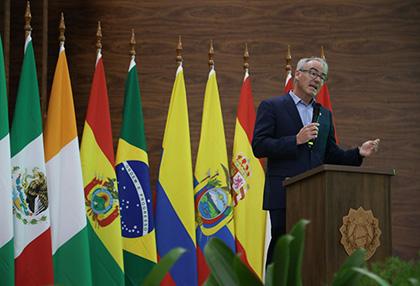UCLA-based Forests Task Force plays a key role during UN climate talks in Brazil
High-level COP30 events gather leaders for policy meetings on finance, preservation, and the ‘new forest economy’

World diplomats are descending on the Amazonian city of Belém this month for COP30, the annual United Nations climate conference, at a critical juncture in the fight against global warming. Joining them are UCLA researchers with an outsized and powerful presence thanks to the organization they lead called the Governors’ Climate and Forests Task Force.
The GCF Task Force, a unique project that came to UCLA School of Law in 2022, is a subnational alliance of governors from around the world who work together on policies to protect forests.
While many U.N. delegates are coming for a week and then heading home, the task force has deep roots in Brazil. The group has been there all year in the lead-up to COP30, holding convenings, skill-building exercises, and policy meetings, including a weeklong conference this May in the Amazon.
That’s where UCLA Law professor William Boyd led a meeting of more than 20 state governors, the environment minister of Brazil, and 800 other participants. “The GCF is getting larger every year, and our voices are getting louder,” Boyd told conference attendees in his opening remarks. “The GCF Task Force was conceived in California, but it was born here in Brazil.”
The group was founded in 2008 by then-California Gov. Arnold Schwarzenegger and a handful of other governors from Brazil and Indonesia. Since then, it has grown exponentially to include 45 states or jurisdictions, encompassing 60% of the forests of Mexico and Indonesia, 75% of the Bolivian Amazon, as well as all of the Peruvian and Brazilian Amazon. The idea is to support the political leadership of state governments in their fight against climate change and deforestation, through training workshops, research assistance, and strategy sessions. These events — held throughout the world, including sometimes at UCLA — seek to empower the civil servants, low-level bureaucrats, and their civil society partners that do the day-to-day work of implementing successful environmental programs.
“Many organizations, governments, and communities are working hard to reverse deforestation — especially in GCF Task Force member states,” says Jason Gray, project director for the Governors’ Climate and Forests Task Force and a UCLA environmental law expert. “But the current economic incentives for clearing land means that at the global level, we are falling short. We are still losing large swaths of tropical forests.”
Gray, Boyd, and the task force have spent the last three years building support among their member jurisdictions for advancing new economic policies that create jobs and revenue for local communities in exchange for preserving their forests. They call this a “Blueprint for the New Forest Economy” — one that reduces the need to clear trees for farming, logging, or mining. At COP30 this month, the task force is holding multiple U.N. side events, panel discussions, and governor roundtables on these proposals.
This general concept is starting to gain traction on a global scale. This month, the Brazilian government is unveiling a new financial tool called the Tropical Forest Forever Facility, a funding mechanism designed to compensate countries for preserving tropical forests. Gray and Boyd have spent months gathering feedback from governors in Brazil, Indonesia, Colombia, Ecuador, and elsewhere to encourage the inclusion of state and provincial participation in the TFFF as it takes center stage at the U.N. climate conference. “We need to pair up state-level strategies that we know can work with new tools like the TFFF, to make preserving forests more economically attractive than cutting them down,” Gray says. “This is a step forward.”
The UCLA team’s efforts got a big boost this July from one of the world’s most famous former governors. At a conference center in São Paulo, the task force convened a meeting between Schwarzenegger, Brazilian governors, and environmental secretaries. Schwarzenegger praised them and gave bear hugs and advice. He reminded them that he had guided California to reduce climate pollution by 25% “independent of the federal government,” and that governors must dig deep and be ambitious even when it seems unpopular.
Schwarzenegger said the U.N. must include governors, like those around the table who work with the GCF Task Force, rather than focus only on national leaders. “People are tired,” he said. “We need to create something new and powerful.”